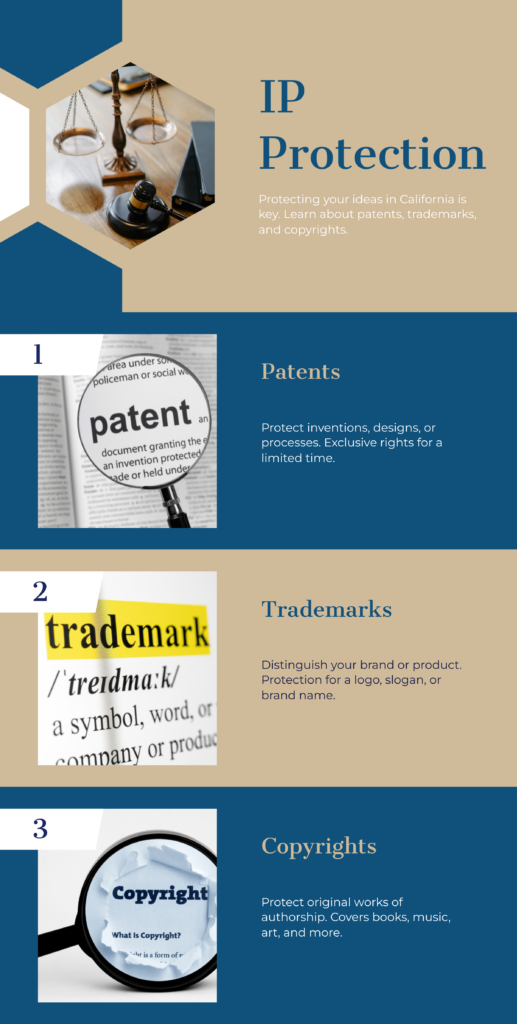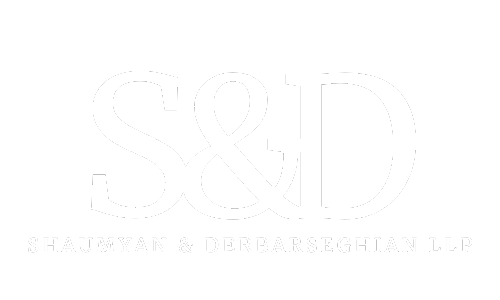
Intellectual property (IP) refers to creations of the mind, such as inventions, literary and artistic works, designs, and symbols. Protecting your IP is crucial for businesses and individuals in California. This guide will help you understand the three main types of IP protection: patents, trademarks, and copyrights.
What is Intellectual Property?
Intellectual property is a valuable asset that can give you a competitive edge. It can be anything from a new invention to a catchy slogan. Here are the three primary ways to protect your intellectual property:
Patents
A patent grants you exclusive rights to an invention for a limited period. To qualify for a patent, your invention must be:
- Novel: It must be new and original.
- Non-obvious: It must not be obvious to someone skilled in the field.
- Useful: It must have a practical application.
Types of Patents:
- Utility patents: Protect the way something works, looks, or is used.
- Design patents: Protect the ornamental design of an article.
- Plant patents: Protect new and distinct plant varieties.
Where to File: You can file a patent application with the United States Patent and Trademark Office (USPTO).
Trademarks
A trademark is a word, phrase, symbol, or design that identifies and distinguishes the source of goods or services from those of others. Trademarks protect brand identity and reputation.
Examples of Trademarks:
- Brand names (e.g., Apple, Coca-Cola)
- Logos
- Slogans
- Product designs
Where to File: You can file a trademark application with the USPTO or the California Secretary of State.
Copyrights
A copyright protects original works of authorship, such as literary, dramatic, musical, and artistic works. Copyright protection exists automatically when a work is created.
Examples of Copyrighted Works:
- Books
- Music
- Software
- Movies
- Photographs
- Paintings
Where to File: While copyright protection exists automatically, you can register your copyright with the U.S. Copyright Office for additional legal benefits.

Importance of Protecting Your Intellectual Property
Protecting your intellectual property is crucial for several reasons:
- Prevent others from stealing your ideas: By registering your IP, you establish ownership and can take legal action against infringers.
- Increase your business value: Strong IP can significantly increase the value of your business.
- Generate revenue: You can license your IP to others for a fee.
How to Protect Your Intellectual Property
- Conduct a thorough IP audit: Identify your valuable assets and assess their protection status.
- Register your IP: Take the necessary steps to register your patents, trademarks, and copyrights.
- Use confidentiality agreements: Protect your trade secrets with non-disclosure agreements.
- Monitor for infringement: Regularly search for potential infringements of your IP.
- Consider IP insurance: Protect yourself from financial losses due to IP infringement.
Frequently Asked Questions (FAQs)
Q: How long does patent protection last? A: Utility patents last for 20 years from the filing date, while design patents last for 15 years.
Q: How long does copyright protection last? A: Copyright protection lasts for the life of the author plus 70 years.
Q: How can I protect my business name? A: You can protect your business name by registering it as a trademark.
Q: What is a trade secret? A: A trade secret is confidential information that gives a business a competitive advantage. Examples include customer lists, formulas, and business plans.
Need Legal Help?
Protecting your intellectual property is essential for the success of your business or creative endeavors. By understanding the different types of IP protection and taking proactive steps to safeguard your assets, you can protect your valuable creations and build a strong foundation for your future.
Shaumyan & Derbarseghian, LLP is committed to helping clients protect their intellectual property rights. Our experienced attorneys can guide you through the complex process of obtaining and enforcing IP protection.
Contact us today for a free consultation.

